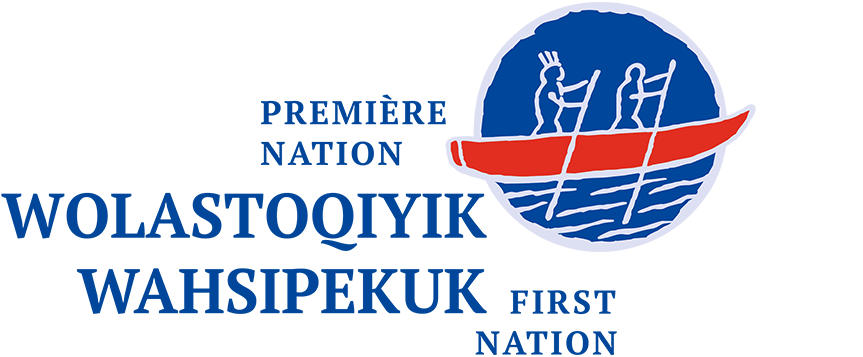

Home / Lessons / Level 2 / 10. Summary of Concepts
| - KEY NOTION - |
|---|
| Question terminology | ||
| Tama ? | Where? | Tama iyu Piyel ? / Where is Peter? |
| Wen ? | Who? | Wen wot ? / Who is this? |
| Keq ? | What? | Keq liwisu ? / What is his/her name? |
| Tan ? | How? | Tan ktolomolsin ? / How do you feel? |
| Using nil (n) and kil (k) | |
| Kotuhp ? / Are you hungry? | Nkotuhp. / I am hungry. |
| Ktoliwis Atwin ? / Your name is Anthony? | Ntoliwis Antoine. / My name is Anthony. |
| ‘Kikuwoss wiku Rimouski ? / Your mother lives in Rimouski? | Nikuwoss wiku Rimouski. / My mother lives in Rimouski. |
| Good and bad: moci/moco | ||
| Wolihpukot / Mocihpukot | Tastes good / Tastes bad | (I) |
| Wolihpuksu / Mocihpuksu | Tastes good / Tastes bad | (A) |
| Wolokiskot / Mocokiskot | It’s nice weather / It’s bad weather | (I) |
| Positive Form | Negative Form |
|---|---|
| Nomihtun / See (I) | Ma-te nomihtuwon / Don’t see (I) |
| Nomiya / See (A) | Ma-te nomiyaw / Don’t see (A) |
| Nulomols / Feeling good | Ma-te nulomolsiw / Not feeling good |
| Nkoti-maha / Want to eat | Ma-te nkoti-mahaw / Don’t want to eat |
| Animate | Inanimate | ||
|---|---|---|---|
| Not This (close to) |
Milin not opan. / Give me this bread. Npawala not lakalet. / I want this bread. |
Nit This |
Milin nit kahpe. / Give me this coffee. Npawatomon nit ti. / I want this tea. |
| Yat That (far) |
Milin yat cikon. / Give me that apple. Npawala yat minsoss. / I want that raspberry. (singular form) Npawalak yehkt not minsossok / I want these raspberries. (plural form) |
Yet That (far) |
Milin yet wawon. / Give me that egg. Npawatomon yet alincis. / I want that orange. |
| Yut* (here) |
* | Wot* (here) |
* |
| * We don’t use the particles ‘yut’ and ‘wot’ to ask for something, because they mean that we already have them with us (here). | |||
| ENGLISH | QUESTIONS | ANSWERS |
|---|---|---|
| How are you? | Qey ! Tan kahk olu kil ? / Hi! How are you? | Qey ! Mec-ote pesqon. Kil-olu tan ? / Hi! I am good. And you? |
| How do you feel? | Qey ! Tan ktolomolsin pemkiskahk ? / Hi! How are you feeling today? | Qey ! Nulomols pemkiskahk. / Hi! I feel good today. |
| Who are you? Who am I? | Ntoliwis nil Piyel. Keq kil ktoliwis ? / My name is Peter. What is your name? | Ntoliwis nil Ahtuwen. / My name is Anthony. |
| Where do you come from? | Tama kil ‘kuceyaw ? / Where do you come from? | Nuceyaw nil Rimouski. / I come from Rimouski. |
| Where do you live? | Tama kil kwik ? / Where do you live? | Nwik nil Kepek. / I live in Quebec. |
| What is her/his/their name? | Keq liwisu kmihtaqs ? / What is your father’s name? Keq liwisuwok wilomossok ? / What are your cousin’s names? (male) |
Nmihtaqs liwisu Ahtuwen. / My dad’s name is Anthony. Wilomossok liwisuwok Piyel naka Polansuwe. / My cousin’s names are Peter and Francis. |
| Do you want to eat? | ‘Koti maha opan ? / Do you want to eat bread? | Aha, nkoti-maha opan. / Yes, I want to eat bread. Ontama, ma-te nkoti-mahaw opan. / No, I don’t want to eat bread. |
| Are you hungry? | Kotuhp ? / Are you hungry? | Aha. Nkoti mahak nisuwok lakaletok. / Yes, I want to eat two frybreads. Aha, nkotuhp naka nkoti micin wawon. / Yes, I am hungry and I want to eat an egg. |
| Do you see? | (Animate) Knomiya not Polansuwe ? / Do you see Francis? |
Aha, nomiya not Polansuwe. / Yes, I see Francis. Ontama, ma-te nomiyaw* Polansuwe. / No, I don’t see Francis. |
| (Inanimate) Knomihtun nit ksap ? / Do you see the soup? |
Aha, nomihtun nit ksap. / Yes, I see the soup. Ontama, ma-te nomihtuwon* ksap. / No, I don’t see the soup. |
|
| Who is this? | Wen wot ? / Who is this? | Piyel. / Peter. Tan kal. / I don’t know. |
| What is this? | Keq yut ? / What is this? | Pocetes. / Potato. Nisonul wapeyikil wawonol. / Two white eggs. Tan kal. / I don’t know. |
| What is it? | Keq nit ? / What is it? (I) | Pihtinaqem nit. / It’s an arm. Npihtinaqemol. / These are my arms. |
| Wen not ? / What is that? (A) | Wotq not. / It’s a knee. Kotkuk nikt. / It’s your knees. |
|
| Who is this? | Wenik nikt ? / Who are they? | Nuhkomossok nikt. / These are my grandmothers. Nitapiyik nikt. / These are my friends (Indigenous). |
| Where are …? | Tama iyultuwok ‘kuhsimisok ? / Where are your younger brothers and sisters? Tama ote ‘tomawey ? / Where is the tobacco? |
Nuhsimisok iyultuwok ihtolokehkitimok. / My younger brothers and sisters are at school. ‘Tomawey ote neqiw possiyanteskik. / The tobacco is under the window. ‘Tomawey ote lamiw wikuwamok. / The tobacco is in the house. |
| « What day was it yesterday » or « What day is it today? » | Keq wolaku ? / What day was it yesterday? Keq pemkiskahk ? / What day is it today? |
Sonte wolaku. / esterday was Sunday. Kissonte pemkiskahk. / It’s Monday today. |
| Can you show me …? | Mec-op-al knostuhmuwin ktun ? / Can you please show me your mouth? | Ntun yut. / My mouth is here. |
| Do you hear? | Knutuwa not kahkakuhs ? / Do you hear the crow? | Aha, nutuwa not kahkakuhs. / Yes, I hear the crow. Ma-te nutuwaw not kahkakuhs. / No, I don’t hear the crow. |
| Do you want? | Kpawatomon welimahask ? / Do you want sweetgrass? | Aha, npawatomon welimahask. / Yes, I want sweetgrass. Ontama, npawatomon welimahask. / Yes, I want sweetgrass. |
| Kpawala kakskus ? / Do you want cedar? | Aha, npawala kakskus woliwon. / Yes, I want cedar thank you. Ontama, ma-te npawalaw kakskus, npawala kuwes. / No, I don’t want cedar, I want pine. |
In this exercise, you will revisit several of the elements seen in both learning notebooks. Read the following short texts, then propose a translation in English.
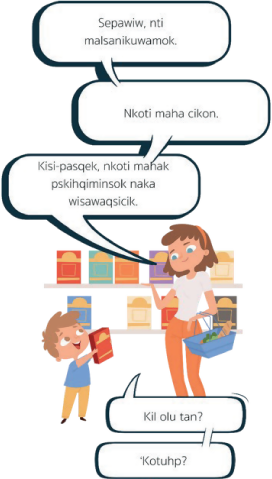
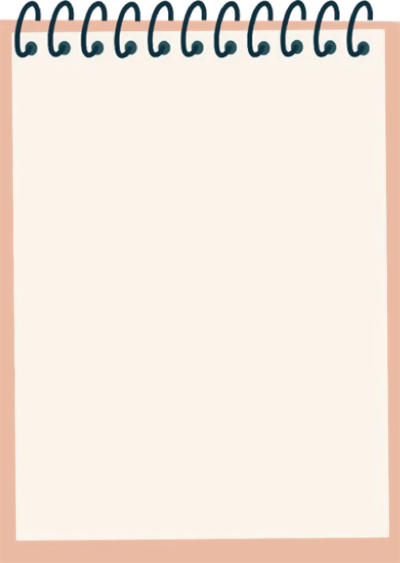
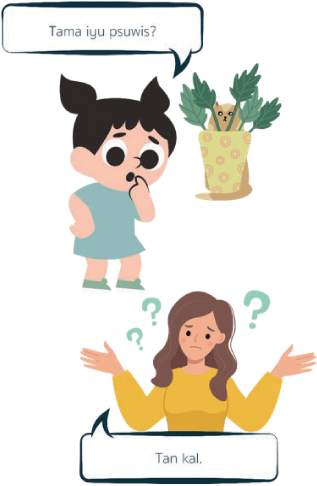

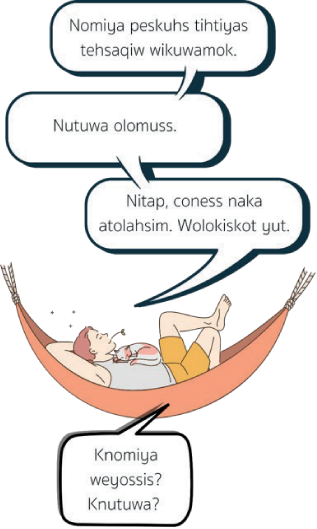

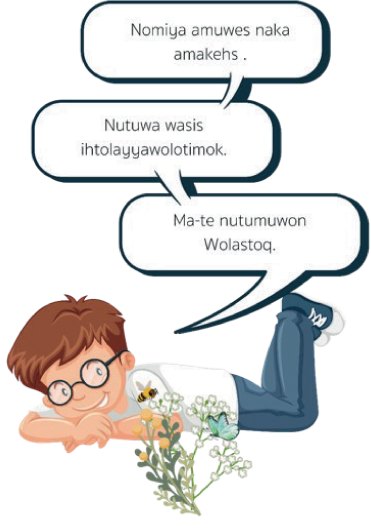

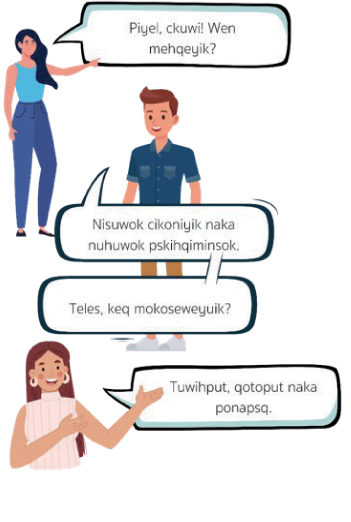

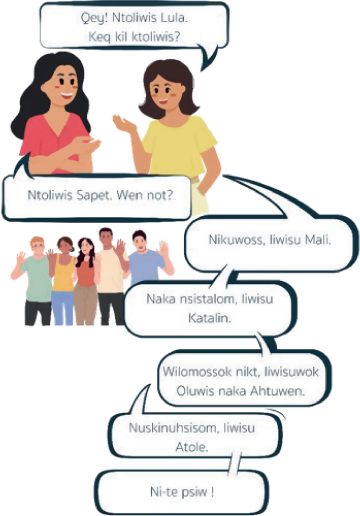

Additional information for exercises solutions may appear in the Appendix of the PDF document.